- Home
- Lisa Gardner
Never Tell Page 15
Never Tell Read online
Page 15
Keith opens his mouth. I immediately hold up a hand to silence him, vigorously shaking my head. I probably should’ve mentioned his presence in the very beginning of the call. Having failed that, I wasn’t about to spook a federal agent by mentioning we had company now.
“You think someone must’ve taught him how to cover his tracks,” I say.
Keith is scribbling furiously. He holds up a note.
I continue: “Maybe even told him about particular apps that would assist in clearing his hard drive.”
Keith nods.
“What did this Conrad Carter do?” Quincy asks.
“I don’t know. He traveled. Spent time in the South, I know that.”
“Where did you meet him?”
“A bar. Honky-tonk. He sat down right beside us. After a bit . . . I had the impression Conrad was there for me. Like, maybe Jacob had made a deal with him.”
Keith starts typing.
“Did you leave with him?” SSA Quincy asks.
“No. I threw up on him. Then he went away.”
There’s silence. Keith is no longer typing. I refuse to look at him. I don’t want to see what’s in his eyes.
“Were there other such instances?” Quincy asks. “Other meetings with other men?”
“No. But soon after that . . . I realized I’d never make it if I kept fighting.” I stare at nothing in particular. “I decided to become Jacob’s friend. Make him need me a little, as my entire existence depended on him.”
“You survived, Flora. That’s what matters. You picked a strategy and it enabled you to come home safe to your family.”
I smile; I can’t help myself. But I know it’s a sad expression, because both my mother and brother will tell you that I didn’t come home at all. They just got a shell that looks like their beloved daughter and sister, except there’s nothing left on the inside.
Keith is scribbling another note. He holds it out to me. I read his question to the agent. “When was the last time the computer was analyzed?”
“Six years ago.”
I glance at Keith, already anticipating his next point. “There have been advancements in computer forensics since then,” I say.
He nods vigorously.
“Given the new development, I could have the computer reexamined. Did Jacob strike you as techie?”
“No. But—” I catch myself. “He was clever. And mechanical. I mean, he could keep his rig running on his own. And you know, building the pine coffin and all. He prided himself on self-sufficiency. I can’t imagine him in a classroom environment. But pursuing something that would help him get something he wanted, yeah, he’d do that.”
“He still would’ve had to utilize resources,” Quincy states. “We never recovered any books on computers, web surfing, or programming one-oh-one from his vehicle. On the other hand, he only made contact with your mother through internet cafés, which reveals a certain level of sophistication right there. He knew better than to use his own laptop, which we might have eventually been able to trace back to him via IP address, et cetera.”
“You never found the cabin in Georgia.”
“We’ve never found anything resembling a permanent residence for Jacob Ness.”
“His lair,” I murmur. “What about his mother?”
“He used her address for mail. According to her, she hadn’t seen him in years. We did a full sweep of that house, mostly recovering clothing and porn.”
“There should’ve been porn on his computer. He was always watching porn.”
“We found DVDs in the front cab; nothing on the computer. Not even a history of porn-site visits or searches.”
“That’s not right. The guy was a sex addict. His computer should’ve been ninety percent smut.”
Across from me, Keith is nodding. Predator one-oh-one, no level of murder or assault is ever enough for them. They all have to feed their appetites in between, even the ones who travel around the country with their own girls stashed in coffin-sized boxes.
“I’m going to get on a plane in the morning,” Quincy says.
I nod, then realize she can’t see me. “Okay.”
“I want to know everything about Conrad Carter.”
“Be sure to use your nice voice,” I offer weakly, already picturing D.D.’s face when the federal agent shows up at HQ. Maybe I should warn her in advance. Or call Samuel and beg for safe harbor.
“I’m going to use my bright, shiny federal shield.”
Yep, I’m a dead woman. “I want information on the other missing women,” I say, because as long as my time on this earth is limited . . .
Keith nods adamantly.
“Flora—”
“I have more to offer.”
“Than embroiling me in a pissing match against one of BPD’s toughest detectives?”
“I want to find his lair. We need it. If we could find it, think of the evidence.”
My voice is soft but certain. Keith regards me curiously. I can’t decide if he thinks I’m incredibly brave or truly self-destructive. Quincy must think the same because she doesn’t answer for a long time.
“We already checked for cabins in Georgia whose owners died the year you were abducted. We didn’t have any luck,” she says at last.
“Maybe it wasn’t Georgia. Maybe the owner didn’t die. Maybe he lied to me, another layer of protection in case I did manage to escape. I mean, if we’re now saying Jacob was clever enough to wipe his laptop, what’s a few lies to a girl he has locked in a box?”
Again the silence. Then, because I can’t help myself: “Was there other forensic evidence in the box? Of, you know, of other girls?”
“We think he built the box for you.”
There’s something in the way she says it that catches my attention. “But it wasn’t his first box,” I fill in slowly. “There were others, for . . . other girls.”
“An UNSUB doesn’t achieve Ness’s level of organization and sophistication overnight.”
Which is nothing new. Keith had already told me the same. But it’s starting to hit me now. Truly register. I might’ve been Jacob’s last girl. Maybe his longest-surviving girl. But there had been others. Ones who, most likely, had been fed to the gators. Ones who’d screamed and begged and still never made it home. Maybe they’d each slivered their fingers on the crudely bored air holes, then sucked their own blood to have something to do. Maybe they’d recited their favorite stories, the names of their childhood pets. Maybe they’d promised anything, everything, if they could just see their mom, brother, boyfriend, ever again.
Except it never happened.
And I’d failed them. Me, the one who did survive. I killed Jacob Ness. I put a gun to his head and pulled the trigger because it had to be done. Then I came home to my family and left all those poor girls behind. Never asked any questions. Never provided any answers. Simply abandoned them, faceless victims whose bones were moldering God knows where, whose own loved ones would never have the closure at least my mom and brother got.
I don’t feel guilty. I feel ashamed. I can’t look at Keith anymore, because I don’t want him to see my eyes filling with tears.
“There are memory techniques,” Quincy says at last.
“I know.”
“Dr. Keynes,” she begins.
“He’ll help us,” I answer for him.
“And if he recommends against it?”
“He won’t. I’m a survivor. Survivors are tough. If I could endure the real thing, then I can handle the memories.”
“I’ll be on the first flight in the morning,” Quincy says.
I nod. A tear splatters down onto the screen of the smartphone. Keith doesn’t touch me. But he does reach over and gently wipe the moisture away.
I end the call.
CHAPTER 16
EVIE
THE FIRST THING THAT HITS me when I get out of my lawyer’s car is the smell. Charred wood, slightly smoky, and not unpleasant. It brings to mind Sunday afternoons cozied up before a nice fire, sipping tea, listening to the Pats game on TV.
I have to stand perfectly still before I can fully process that it’s not a barbecue in front of me, but the remains of my home.
Mr. Delaney lets me be. He answered my call in the middle of the night without hesitation. No doubt used to odd hours, given his job as a defense attorney. And no doubt understanding that it took that long for me to finally be free from my mom, who had to complete her nightly martini ritual before turning in for bed.
It’s seven thirty, the sky just starting to lighten given the short days this time of year. The temperature remains below freezing. We are both bundled up in wool coats, hats, and gloves. Half of my neighbors still have their Christmas lights on from the night before, twinkling borders around their roofs, windows, ornamental shrubs.
It gives the whole scene a surreal feel. Merry Christmas! P.S. All that remains of your life is a charred shell of collapsing wreckage.
Then the police arrive and it’s time to get the party started.
Sergeant Warren climbs out of the car first, bundled up in a puffy blue down coat, embroidered BPD on the chest. She finishes wrapping a lighter blue scarf around her neck, then pulls on black leather gloves and a knitted hat. She still shivers slightly as she waits for the driver, a younger detective with a shock of red hair, to untangle himself from the front seat. He heads straight for the trunk, removes a rake and a shovel before pulling on a pair of heavy workman’s gloves. Gotta love the Boston PD. Prepared for anything.
D.D. gives me a look, then heads for my lawyer. She addresses her opening comments to him, as if I’m nothing but a signpost. Posturing. As a high school teacher who spends my days working with teens, I’m unimpressed. She can only pretend I don’t matter, whereas I have dozens of students who for months at a time honestly believe I don’t. Till they fail their first test, of course.
“Your client understands that the terms of our initial search warrant still stand, meaning we have the legal right to seize any items relevant to the source of the fire, as well as any additional evidence the fire may have exposed relevant to the shooting which was missed the first time around,” D.D. is rattling off.
Mr. Delaney’s answer is equally crisp: “I’ve discussed the matter with my client. She understands that as owner of the property, she is entitled to anything that isn’t considered evidence in the case. Furthermore, the police bear the burden of proving an item is evidence. Otherwise, it goes to her.”
Mr. Delaney had walked me through it last night. I couldn’t just return to my former residence and search for Conrad’s firesafe filing box. The police would take exception and seize whatever I discovered as a matter of principle. So invite them over. Make a show of cooperating fully with the authorities. They would open the SentrySafe box, but the contents should belong to me. Not like the ignition source of the arson fire was in the middle of a fire-resistant safe.
All I wanted was our financial records, including the copy of the life insurance policy Conrad took out when he learned I was pregnant, as well as our homeowners’ policy. The box also contained our passports, which—in lieu of my now melted driver’s license—I could use as photo ID.
As I told myself last night, I might be sad, but I will not be helpless. I have my unborn child to consider, and my crazy-as-a-fox mother to outmaneuver.
The redheaded detective heads for the pile of charred wood, rake in hand. D.D. refers to him as Neil. He looks like he’s about twelve. Maybe the police are recruiting straight out of elementary school these days. I often thought about teaching the lower grades. My particular math skills, however, would be lost there. And for all my moments of sheer exasperation with high schoolers, every semester I have at least a few students whose potential comes to life. An equation that, for the first time, clicks for them. A test they thought they’d failed only to find they’d earned the A they always knew they could achieve.
You don’t become a teacher without having some level of optimism. And you don’t stay in the field if you don’t believe that everyone, from bitter teens to burnt-out administrators, can change.
I used to think that was one of the things Conrad loved about me.
“Fire chief declared the scene safe,” D.D. is saying now, taking up position beside me. “Still”—D.D. gestures to my bulging waist—“I would recommend you stay clear.”
“The fumes?” I ask.
“A lot of nasty stuff burns up in any house fire.”
I nod, well aware of the plastic pipes, glued laminates, cheap stains, fiberglass insulation, and metal appliances that went into home construction. Yesterday this scene would’ve been borderline toxic. Now . . . now it held the only hope I had of moving ahead.
“I smell gasoline,” I comment.
D.D. eyes me. “So did the arson investigator.”
I have to process this. “So someone killed my husband, then the next day, burned down our house?” My voice sounds surprisingly steady. Maybe because even as I say the words, I don’t really believe them. Conrad and I . . . A schoolteacher and a window salesman. Surely, this couldn’t have happened to us. This couldn’t be us. “Do you know why?”
“I was hoping you could tell me.”
“I didn’t do this. I’m not just a wife, I’m a mother.” I shake my head. “No mother would do this.”
D.D. simply stares at me. I lapse back into silence, but I am shivering slightly. Standing in front of the decimated remains of my life is no longer just sad; it’s scary. Because a person who would murder a man, burn down a house . . .
I don’t know what happened. Worse, I don’t know what will happen next.
The redhead has started working the piles of rubble, using the shovel to lift off charred pieces of sheetrock, collapsed two-by-fours. Mr. Delaney had told them what we were looking for: a fire-rated lockbox for personal papers. It’d been upstairs in our master closet. Given its weight, it had most likely crashed down as the fire devoured the floor from beneath it. The firemen hadn’t discovered it yesterday—but then again, they hadn’t really been worried about personal possessions.
“Arson investigator will be returning this morning,” Sergeant Warren says now, still studying me. “Di Lucca is one of the best. Do you know arsonists generally stick to the same MO? That we have a whole database of local firebugs and their preferred methods? It’s only a matter of time before Di Lucca identifies who did this.” She pauses, leaving the end of her sentence implied. And traces that person to you.
“Why in the world would I arrange to burn down my own home, especially with my cell phone, purse, and all personal possessions inside?”
“People do stupid things.”
“Then I must be a real idiot,” I finally snap, “to burn down my own home after already being discovered holding the gun that killed my husband.”
“Maybe you decided shooting the computer—what was it, twelve times?—wasn’t enough.”
Standing behind us, Mr. Delaney clears his throat. D.D. isn’t supposed to be asking questions about the shooting, and she knows it. She’s just trying to rattle me, see what she can shake loose.
“Maybe this isn’t about me,” I say finally. “Maybe this is about Conrad. All spouses have secrets. Just ask your husband.”
The redhead finishes clearing one pile, moves on to the next waist-high collection of rubble. At least the house didn’t have a basement, given the high water table in the area. Some of our neighbors did, and the constant flooding drove them insane. Conrad had liked this house particularly for its slab construction, plus the one-car garage. I had liked its cozy size, the charm of the hardwood floors, even if they’d been trashed at the time.
We’d been happy the day we signed the papers on this h
ome. Bought a bottle of champagne, which I’d clutched to my chest as Conrad carried me over the threshold. I’d been laughing, demanding that he put me down. It all seemed so ridiculous and silly and . . . perfect. A great day for a young couple, with so many great days ahead.
D.D. is still watching me. I shouldn’t get emotional in front of her. I shouldn’t let her know that standing here right now, looking at the destroyed remains of so many dreams, hurts.
The redhead shouts her name. She gives me one last look, then jogs into the debris field toward her fellow detective.
I will have my papers soon enough, I think.
Except a heavy black SentrySafe is not what the redhead has discovered.
* * *
—
THIS LOCK BOX is thin. Maybe an inch tall with roughly the same dimensions as a pad of paper. At first glance, it looks like a tablet computer, which gives me an unsettling thought—I’d shot up a computer, but had I shot up the computer? I don’t know anymore, and this isn’t the time or place to wonder.
The outside of the box is covered in soot and charred along the edges. It doesn’t appear heavy-duty enough for a fire-resistant or waterproof rating; then again, I don’t recognize the box at all.
The redhead detective clutches it tightly against his stomach. I’d sent the detectives for a file cabinet. They’d discovered a small lockbox. All parties are equally confused—and equally suspicious.
D.D. starts the negotiations: “You got a key?”
“Of course not. I don’t even have a fucking cell phone.”
If the profanity bothers them, no one says anything. “The key was kept in the lock,” I lie eventually. “Dig a layer deeper. You’ll find it.”
“Neil,” D.D. orders, taking the box from him.
The twelve-year-old returns to the blackened debris field, rake in hand.
“You said you were looking for a fireproof safe,” D.D. states shrewdly. “You know, like one of heavily reinforced boxes discovered in airplane wreckages.”

 Find Her
Find Her Before She Disappeared
Before She Disappeared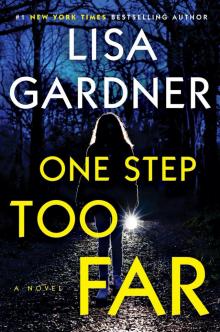 One Step Too Far
One Step Too Far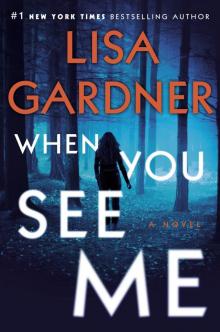 When You See Me
When You See Me Never Tell
Never Tell Touch & Go
Touch & Go The Survivors Club
The Survivors Club MacNamara's Woman
MacNamara's Woman Love You More: A Novel
Love You More: A Novel Gone
Gone The Perfect Husband
The Perfect Husband Maggie's Man: A Family Secrets
Maggie's Man: A Family Secrets The 7th Month
The 7th Month The Neighbor
The Neighbor Hide
Hide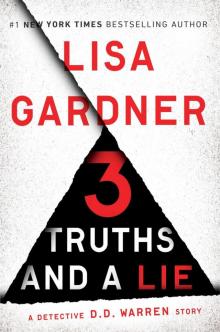 3 Truths and a Lie
3 Truths and a Lie Catch Me
Catch Me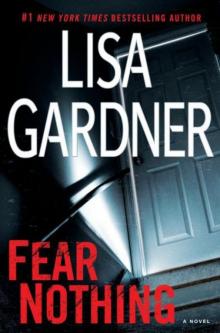 Fear Nothing: A Detective
Fear Nothing: A Detective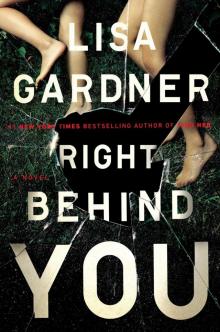 Right Behind You
Right Behind You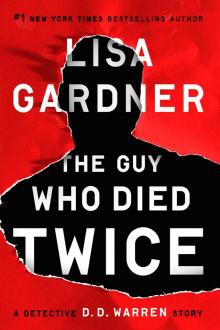 The Guy Who Died Twice
The Guy Who Died Twice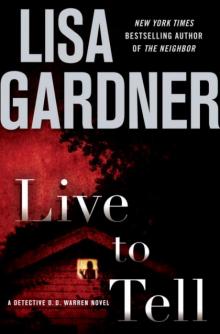 Live to Tell: A Detective D.D. Warren Novel
Live to Tell: A Detective D.D. Warren Novel Live to Tell
Live to Tell Maggie's Man: A Family Secrets Novel
Maggie's Man: A Family Secrets Novel The Other Daughter
The Other Daughter Alone
Alone Crash & Burn
Crash & Burn The Detective D. D. Warren Series 5-Book Bundle
The Detective D. D. Warren Series 5-Book Bundle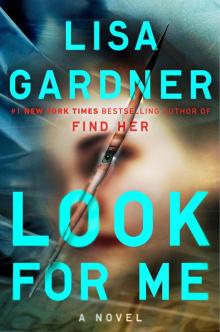 Look for Me
Look for Me Love You More
Love You More The FBI Profiler Series 6-Book Bundle
The FBI Profiler Series 6-Book Bundle The Third Victim (Quincy / Rainie)
The Third Victim (Quincy / Rainie) Say Goodbye
Say Goodbye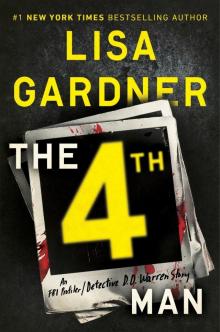 The 4th Man
The 4th Man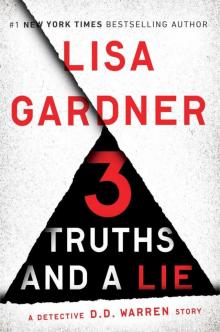 3 Truths and a Lie: A Detective D. D. Warren Story (Kindle Single)
3 Truths and a Lie: A Detective D. D. Warren Story (Kindle Single) Brandon's Bride
Brandon's Bride